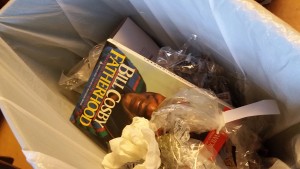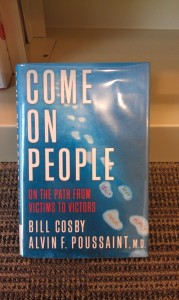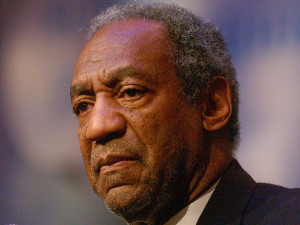When I was nine or ten years old, many an afternoon saw me hanging out at a friend’s house after school. We’d play G.I. Joe in his rec room while watching Bill Cosby: Himself, a 1983 stand-up comedy film which HBO aired frequently in the 1980s and which most suburban White families I knew had on tape. The film is exemplary of Cosby’s style and covers a broad range of topics including marriage and child-rearing, drugs and alcohol, dentistry, and – my personal favorite – one particular cross-country flight in which the entire plane was tormented by an out-of-control four-year-old named Jeffery. Cosby delivered these routines in an appealing conversational style as though speaking spontaneously about whatever happened to be on his mind. He did so without relying on foul language for a laugh, unlike that awful, awful Richard Pryor and George Carlin. (Remember, this was the Reagan 1980s.) And above all, everything he said was incredibly funny. To mainstream Middle American audiences, it was 105 minutes of wholesome family entertainment that could be played in the middle of the afternoon without worrying that young ears might be listening. Bill Cosby: Himself was my first real exposure to stand-up comedy, and cemented Bill Cosby as a superstar in my eyes. The pedestal on which I placed him, like many of the entertainers who shaped my childhood, was a high one, and that has made his fall so much more catastrophic and traumatic.
Cosby’s aforementioned wholesomeness in part led him to rule the airwaves with his Emmy-winning sitcom The Cosby Show, which debuted in 1984. I was a fan, and enjoyed the dynamic of the Huxtable family as well as the similarities between the subject matter of the show and that of the comedy routines I’d enjoyed in the film. However, at age eight I didn’t see the show as a positive portrayal of an African-American family in contemporary America, though it certainly was. To me, and undoubtedly to many of my upper-middle-class White peers, The Cosby Show was simply an entertaining show with the guy from Picture Pages and Fat Albert.
Over time, my interest in Bill Cosby as an entertainer waned, though that is likely due more to reaching adolescence and my attention drifting elsewhere than to any perceived decline in quality. I didn’t watch the finale of The Cosby Show in 1992; I hadn’t watched the show in a couple seasons, though as I recall I was tuning in regularly to the arguably hipper spinoff A Different World. Still, I do remember listening to some of Cosby’s comedy albums around the same time. I still considered myself a fan, though not as ardent a fan as I had been as a child.
I didn’t watch any of the short-lived shows in which Cosby starred during the 1990s, and when his name popped up in the news it was rarely for good reasons; I recall feeling a measure of sadness in 1997 upon learning of the murder of his son Ennis, who had been referenced prominently in Bill Cosby: Himself. I was surprised, then suddenly not so surprised, to hear later that year that Cosby had an affair with a woman in the mid-1970s and possibly fathered a daughter. In light of the wholesome image he’d worked so hard to cultivate and protect, it was strange to think of Cosby with sexual urges, and moreso to consider that he’d cheated on his wife. But I realized that, like all of us, he was human.
In my late twenties, a well-meaning relative got me a couple tickets to see Bill Cosby live. Years earlier she and I had talked about how much we enjoyed The Cosby Show, but I doubt I’d mentioned his name to her in the better part of twenty years. I didn’t go, nor did I have much interest in seeing him perform. Isn’t he a motivational speaker now? I ended up selling the tickets to a couple friends who went in my stead.
I’d heard much about Cosby lecturing Black parents on how to properly raise their children – notably the “pound cake” speech he delivered in 2004 – and tackling what he saw as serious problems with Black culture. While I didn’t necessarily disagree with what he was saying (though I took – and continue to take – issue with the idea that the theft of a piece of pound cake justifies lethal force by police as Cosby seemed to suggest), it didn’t exactly seem like my place to listen. Perhaps my waning interest in Cosby during the last fifteen years or so, since his transition from comedian to public moralist, can be traced to the fact that, as a young White man, he wasn’t speaking to me. I felt uncomfortable consuminig his messages lest I appear to be standing in judgment of an entire race whose struggles were vastly diferent than my own.
Additionally, the abrupt about-face shook my perception of Cosby as a comedian and entertainer. However, that’s not to say that a man best known for comedy can’t, or even shouldn’t, be serious when the situation warrants it. “Bill Cosby said some real shit and the whole world freaked out on him,” said Dave Chappelle in his 2004 standup film For What It’s Worth. “Just because he was selling Pudding Pops for the last forty years, people forget that he’s…from the projects, and he might say some real shit from time to time.” Fair enough.
And it wasn’t exactly a new stance. I recall reading a 1997 interview in Newsweek in which Cosby raged against, amongst other things, the comedy film Booty Call. He decried it, and similar pop culture as “stuff that shows [young African Americans] only interested in the flesh and no other depth.” I never saw the film; such low-brow comedies were never my cup of tea. Still, at the time I agreed with his assertion that such negative portrayals of African Americans in the media helped to perpetuate racism.
However, despite my lack of interest in Booty Call I likened to censorship his claim that there was no need for such a film to even exist. Booty Call grossed more than $20 million on a $7 million budget. Obviously people wanted to watch movies of this type. At that age, steeped in film culture, hungry to watch as many movies as I possibly could, and with a couple partially-written screenplays under my belt, I couldn’t bear to consider the notion that any film shouldn’t be made. With the greater social impact of negative pop culture far from my mind, I saw Cosby as an alarmist resisting change.
As I’ve gotten older it is my opinion that a great many of the films Hollywood churns out lack any substantial artistic merit. Do I feel like most of Michael Bay’s filmography actively harms our culture? I don’t know whether I’d put it in those exact terms, but I can’t say for certain that the Transformers film series isn’t making Americans stupider. So maybe I’ve softened a bit with regard to Cosby’s condemnation of Booty Call.
One thing to which I cannot possibly soften, however, are the dozens of allegations of rape that have been brought against him. As I played with G.I. Joe figures in my friend’s rec room and listened to Cosby liken the doctor present at the delivery of his first child to Cincinatti Reds catcher Johnny Bench, I couldn’t have imagined that this man, who would be given the Presidential Medal of Freedom in 2002, and who would receive honorary degrees from more than fifteen colleges and universities, could be one of the most prolific serial rapists in American history. This is a man people let into their homes week in and week out for almost a decade. A man we trusted. A man whose albums we played, whose books we eagerly scooped up and read.
In fact, while helping my daughter clean her room last week I found a copy of Cosby’s 1987 tome Fatherhood, which I had apparently acquired somewhere prior to her birth, intended to read, and never did. When I tweeted a photo of the book before tossing it in the donation bag, our friend Curvaceous Dee suggested I might be able to get some blogging mileage out of it. I stumbled upon an article in which several of Cosby’s books are examined, with certain passages highlighted for creepiness in light of all we now know about the man’s proclivities. Fatherhood isn’t included in the article; apparently there’s nothing there that would give a reader pause in 2015. Still, best to play it safe.

“It’s just sad,” Jill said recently when we were discussing Cosby’s misdeeds. “He was such a big part of my childhood. We’d all watch The Cosby Show together as a family. It was something everybody enjoyed. We could all quote his routines, too. My favorite is the bit about labor pains. ‘Take your bottom lip and pull it over your head.’ I actually thought about that when I was in labor. He was so funny, plus it was nothing but wholesome values, the kind of thing you could watch with your parents. Good memories. Now they’re tainted.”
I originally typed “alleged misdeeds” in the above paragraph, but deleted it. While I am sadly convinced of his guilt at this point, it feels strange to state that he actually is guilty, as if part of me still doesn’t want to believe the countless charges that have been levied against him by a host of women. After all, nothing has been proven in a court of law, and given the statute of limitations on rape cases in most jurisdictions, it’s likely that nothing will ever be.
But if it takes more than forty indepdent accusations, all describing very similar assaults – to say nothing of Cosby’s recently-released 2005 testimony that he acquired quaaludes in order to drug women for the purposes of sex – to convince you that these incidents actually occurred, then as I have long feared we are a morally bereft, misogynist society that has no real use for its women other than as objects. To anyone still holding fast to his belief in Cosby’s innocence, what would it take to make you believe that this benevolent television father figure to a generation of children could harbor such a dark side? Does the accuser have to be your mother, your wife, your sister, your daughter? Or would that still not convince you?
Celebrities and public figures who I admire and respect, such as Chuck D. of Public Enemy, have suggested that the backlash against Cosby amounts to character assassination, and liken the tarnishing of Cosby’s legacy to book burning in Nazi Germany. To be fair, I believe that Cosby opened the door for his legacy to be tarnished – or perhaps even tarnished it himself – when he made the conscious choice to abuse women.
I’m sure Cosby blames the media, just as he did years earlier in his criticism of Booty Call. After all, the media has certainly had a field day airing the comedian’s dirty laundry. But what amount of coverage is commensurate with such a hideous story? Should the media instead downplay the allegations? I don’t think so. To let the decades of admittedly entertaining and funny work Cosby produced speak for him while sweeping under the rug the horrible crimes he committed would be a slap in the face to his many victims.
Tarnishing his legacy? Fuck his legacy. If I had to not only see the face of my currently-not-in-prison rapist every time I turned on Nick at Nite but also know that he was receiving royalty payments for every rerun, that would probably put a damper on my sunny disposition. And believe me, if Cosby is somehow exonerated beyond a reasonable doubt in the court of public opinion, I’ll be the first to tack an addendum onto this post and admit that I was wrong.
Still, I pray I never have to as the thought of what such a series of false accusations would do to legitimate claims of rape would be terrifying. It’s a moot point; I’m certain I won’t be proven wrong. The very thought that Cosby’s victims are involved in a massive conspiracy to destroy the aging star is too laughable to be believed. This isn’t 1987, with Bill Cosby sitting at the top of the television heap; he’s nearly eighty years old and far from the height of his power. What is to be gained? Why would these women wait until the man’s autumn years rather than going after someone with more to lose?
Former defenders Jill Scott and Whoopi Goldberg have both made an about-face recently in light of the release of Cosby’s 2005 testimony, and I’m glad. I don’t care what may have been considered acceptable in a less enlightened era, consent is everything. Considering a woman’s consent implied after you’ve plied her with drugs is one of the biggest dick moves in the sexual spectrum. Additionally, Cosby’s handling of the situation shows a profound lack of class, though admittedly not as profound as committing multiple instances of sexual assault over the course of several decades. Whether he’s making jokes at live performances about the dangers of drinking in his presence or attempting to shift the blame onto his victims, Cosby has repeatedly shown a lack of civility unexpected to those who still think of him as Cliff Huxtable.
And let’s not forget the hypocrisy. That someone could so vociferously insist on a certain standard of behavior in others while comporting himself in this manner is despicable. That it was someone once so beloved to such a broad spectrum of humanity is nearly unthinkable. I can’t see much of a difference right now between Bill Cosby lecturing Black America to behave itself while raping dozens of women and Newt Gingrich or any of a number of tired White conservative hacks who similarly fail to practice what they preach. Per an article at Madame Noire:
Cosby has always been a moralist and a conservative who goes on tours blaming Black people for our own oppression in America. He told us to pull our pants up, stop buying our kids Jordan sneakers and quit stealing poundcake. We needed to be dignified and respectable at all times. And maybe, just maybe, folks would respect us and stop being racist to us. And while he was telling us to stop being shiftless and engaging in criminal behavior, he was buying quaaludes with the express purpose of having sex with unconscious women.
I don’t wish to make it sound like I’m trying to liken myself or my generation to Cosby’s victims, or to co-opt their pain, their struggle, or their victimization. But they aren’t the only ones affected by his actions. Everyone who’s ever been entertained by Cosby’s standup comedy albums or his television series, who’s ever bought a ticket for Ghost Dad or Leonard Part 6 (my condolences), who’s ever admired the man for his philanthropy and activism, is potentially hurt by this. At the risk of overstatement, it’s not unlike losing a cherished and very special family member.
There is unlikely to be any criminal penalties in Cosby’s future, and the results of a pair of lawsuits brought against him are likely still in the distant future. What consequences could possibly exist for him at this point? Understand that no consequences for a life spent in this manner is too abhorrent to consider. That all of his pending projects were hurriedly canceled seems fitting, though I’m not necessarily in favor of further tarnishing his legacy vis-à-vis his previous works; perhaps it isn’t fair to those who contributed to his many projects to see his films and television series removed from the public eye like the Confederate Flag. I just can’t see myself ever watching any of it ever again. Not even Bill Cosby Himself.

Seriously though. Pound cake? Who likes pound cake enough to steal it? Get real.

I like how you found a book and created this thoughtful post, and I enjoyed reading it.